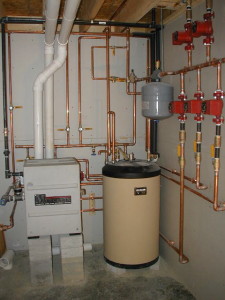Crucial Procedures for Residential Property Owners Managing Malfunctioning Hot Water Systems
Crucial Procedures for Residential Property Owners Managing Malfunctioning Hot Water Systems
Blog Article
What're your insights and beliefs on Maintaining & Draining a Water Heater?

Whether it is situated in the basement or a different area, broken water heating systems can create tension. Having no hot water supply is likewise problematic.
Turn Off Source Of Power
Prior to calling the plumber, shut down a gas hot water heater by turning the temperature dial. This is usually located at the top of the thermostat. If you have a version that runs on electrical power, switch off the circuit breaker. This will stop electrocution, particularly if there is a leak as water is a conductor. Generally, the burner shuts down when the water hits a certain temperature. Yet with a damaged container, it may malfunction. Sufficing off assures you stay secure.
Cut Off the Cold Water Supply
Cut off the tanks tap water supply from the source. When your tank is in good condition, the cool water stops loading up when the tank is full. If you can not find it or reach it, you need to turn off that major water supply line outside your home.
Call the Plumber
After doing the very first 2 safety steps, you need to call your plumber to come right away to fix a burst hot water heater. However, bear in mind that your device will not just collapse considerably overnight. There are generally indications that your aging water heater has sediment accumulation in the interior. Bear in mind of the following:
Instead, as soon as you identify these indications, have actually a specialist come to examine your water heating system thank. Typically, water heating units have a lifespan of about 8 to 12 years.
Clean Up Property
After calling the plumber, document damage by taking notes and photos so you can assert your homeowner's insurance coverage. From there, start the instant clean-up. Secure any essential belongings to avoid further soaking. Eliminate any type of standing water to prevent mold and mildew and also mold development. If you have a completely submersible water pump, utilize that to drain the water. Or else, the standard pail approach will certainly also work. Attempt to wipe out everything, consisting of walls and baseboards. Maintain them running to maintain air distributing if you have an electrical fan and dehumidifier. This will certainly aid prevent mold and mildew development.
Bear in mind, if you observe any problems with your water heater, call the pros right away. You can not take this problem lightly due to the fact that a damaged thermostat can raise water temp to a dangerously high degree, leading to unexpected burns.
Whether it is located in the basement or a different area, damaged water heating units can trigger anxiety. Prior to calling the plumber, closed off a gas water heating system by turning the temperature level dial. After doing the very first 2 safety and security actions, you must call your plumber to come right away to deal with a ruptured water heater. If you have a submersible water pump, utilize that to drain the water. Remember, if you observe any kind of concerns with your water heater, call the pros right away.
When You Should Turn off Your Water Heater
When the main water supply is shut off
There are many circumstances in which the main water supply is turned off. When this happens, many homeowners wonder if it’s safe to keep the water heater on of it should be shut down too.
In most cases, it may not be necessary to turn off the water heater, but it also won’t hurt, either. However, there are two reasons when you should turn off the unit to prevent too much pressure or heat from building up inside the tank:
When there’s a leak
If your water heater springs a leak due for a variety of reasons, including age or a valve malfunction, you should always turn off the unit and shut off the water supply until the issue is resolved.
https://www.libertyplumbingheatingandair.com/blog/when-you-should-turn-off-your-water-heater/

As a serious reader on Maintaining & Draining a Water Heater, I thought sharing that piece of content was really helpful. Remember to take the time to promote this blog entry if you enjoyed reading it. I enjoy reading our article about Maintaining & Draining a Water Heater.
We're alert, ring! Report this page